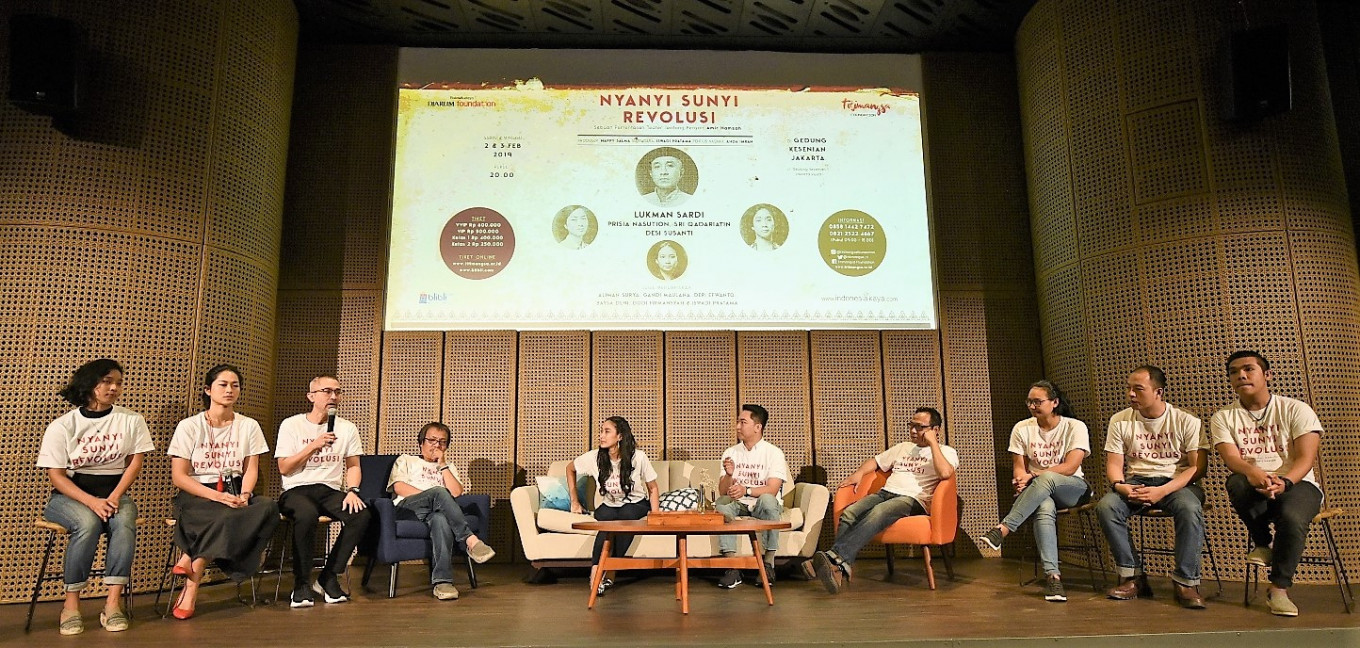Popular Reads
Top Results
Can't find what you're looking for?
View all search resultsPopular Reads
Top Results
Can't find what you're looking for?
View all search results‘Nyanyi Sunyi Revolusi’ rekindles legacy of Amir Hamzah
The legacy of the late Indonesian poet Amir Hamzah is to be brought to the stage through the play Nyanyi Sunyi Revolusi (The Quiet Singing of Revolution).
Change text size
Gift Premium Articles
to Anyone
A
fter staging the Pramoedya Ananta Toer-inspired play Bunga Penutup Abad (The Flower that Ends a Century), a spotlight is being put on the late Indonesian poet Amir Hamzah.
Titimangsa Productions and the Bakti Budaya Djarum Foundation are to burnish his legacy through a play called Nyanyi Sunyi Revolusi (The Quiet Singing of Revolution), to be staged at the Gedung Kesenian Jakarta playhouse on Feb. 2 and 3.
“When we were researching Amir Hamzah, we realized that his work was beyond his era,” said actress Happy Salma who produces the play, which is to be Titimangsa’s 39th production.
“His Sumatra-ness is very subtle in his poetry,” added Happy, who also met with Amir’s granddaughter as part of her research.
The son of a sultanate royal in Langkat, North Sumatra (formerly East Sumatra), Amir Hamzah was born in 1911. His Melayu heritage informed his work as a poet, with his poetry collections — Nyanyi Sunyi (1937) and Buah Rindu (Longing, 1941) — regarded as a part of Indonesia’s enduring literary legacy.
Renowned critic H.B. Jassin dubbed Amir the king of the Poedjangga Baroe literary movement — making up the pantheon with the likes of Armijn Pane and Sutan Takdir Alisjahbana. In 1975, Amir was declared a national hero.
Telling the story of his life at the cusp of the struggle against Dutch colonialism, the bulk of Nyanyi Sunyi Revolusi is culled from the recently deceased writer N.H. Dini’s biography of Amir called Pangeran Dari Seberang (The Prince from Across).
“I was supposed to meet with N.H. Dini when I got sick,” Happy said, adding that she died shortly afterwards. Nyanyi Sunyi Revolusi is therefore also a tribute to N.H. Dini.
Director Iswadi Pratama, who made a name for himself in Lampung and beyond – his play, Perempuan di Titik Nol (A Woman At Point Zero), earned Tempo magazine’s best theater designation in 2008 – said that Indonesia needs Amir Hamzah today.
“You’d be disappointed if you expected to come out of this play feeling empowered to revolt. The play’s such an intimate space,” he said.
That intimate space is also full of love. Nyanyi Sunyi Revolusi dedicates its two-hour run time to the love story of Amir and Ilik Sundari, a Javanese woman, to Tengku Kamaliah and to his country, according to poet and playwright Ahda Imran, who wrote the script.
“At that time, there was a saying: Make sure that the fruit doesn’t fall far from the tree,” he said. “It was uncommon to marry someone from outside your kin, especially if you’re royalty.”
Although the genesis of the play came out of the correspondence between Happy and Ahda from a couple of years back, it wasn’t until a few months ago that production really started.
Continuing his streak in theater, acclaimed actor Lukman Sardi, who played Jean Marais in Bunga Penutup Abad, is to take on the role of Amir, while actress Prisia Nasution is to play Amir’s daughter, Tengku Tahura.
Aside from renowned theater troupe Teater Garasi’s mainstay Sri Qadariatin, who is to play Amir’s lover Ilik Sundari, another theater group based in Lampung, Teater Satu Lampung, is to take part in the play, bringing along Desi Susanti, who is to play Amir’s eventual wife, Tengku Kamaliah.
“He was a great character. He wasn’t garish with his passion,” said Lukman. “This is the interesting part [about playing him].”
Prisia, who works mostly as a screen actress, was frank about her stage fright. “If I were an MC, I would perhaps fire myself,” she said. “But after discussing with [Iswadi], I realized the impulses we use in film are similar in plays. The next step, after befriending the stage, is befriending the character Tahura. The sins of her family are passed down to the child.”
Nyanyi Sunyi Revolusi is to be a new chapter in Happy’s dream to “adapt the works of Indonesian literature to the stage”.
Theater art, according to her, does not yet have a market in Indonesia. “We’re still building an ecosystem for this business,” she said.
However, Amir Hamzah — his work and his life (there is controversy surrounding his death) — would bear witness to the rekindling of Indonesian literature on stage, after Chairil Anwar (through the play Perempuan-Perempuan Chairil or Chairil’s Women) or Pramoedya.
To Iswadi, the gist of Amir’s life can be boiled down to just two words: loving and forgiving.
“He would have probably whispered those words in our ears today. He died by them,” he said. (ste)











